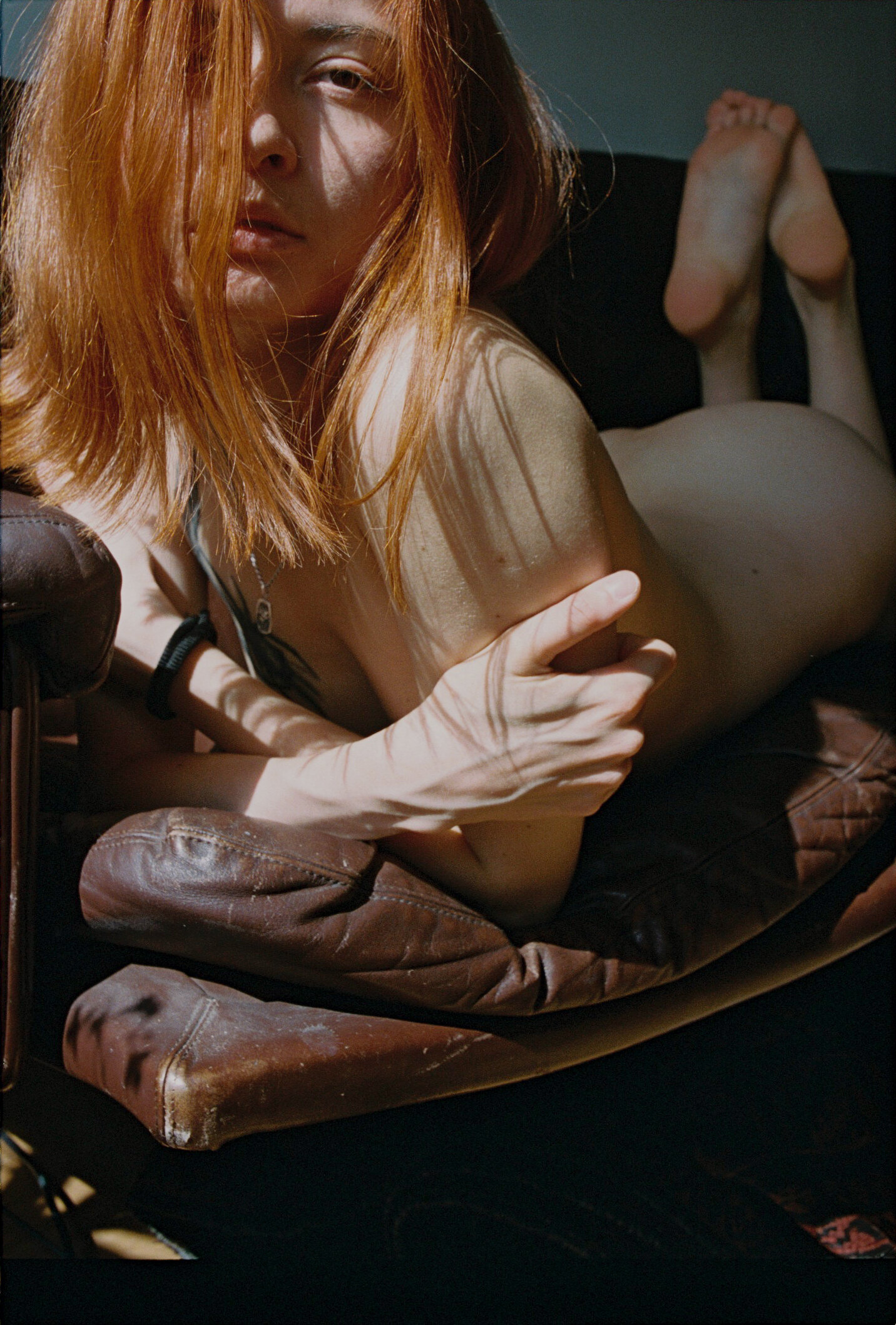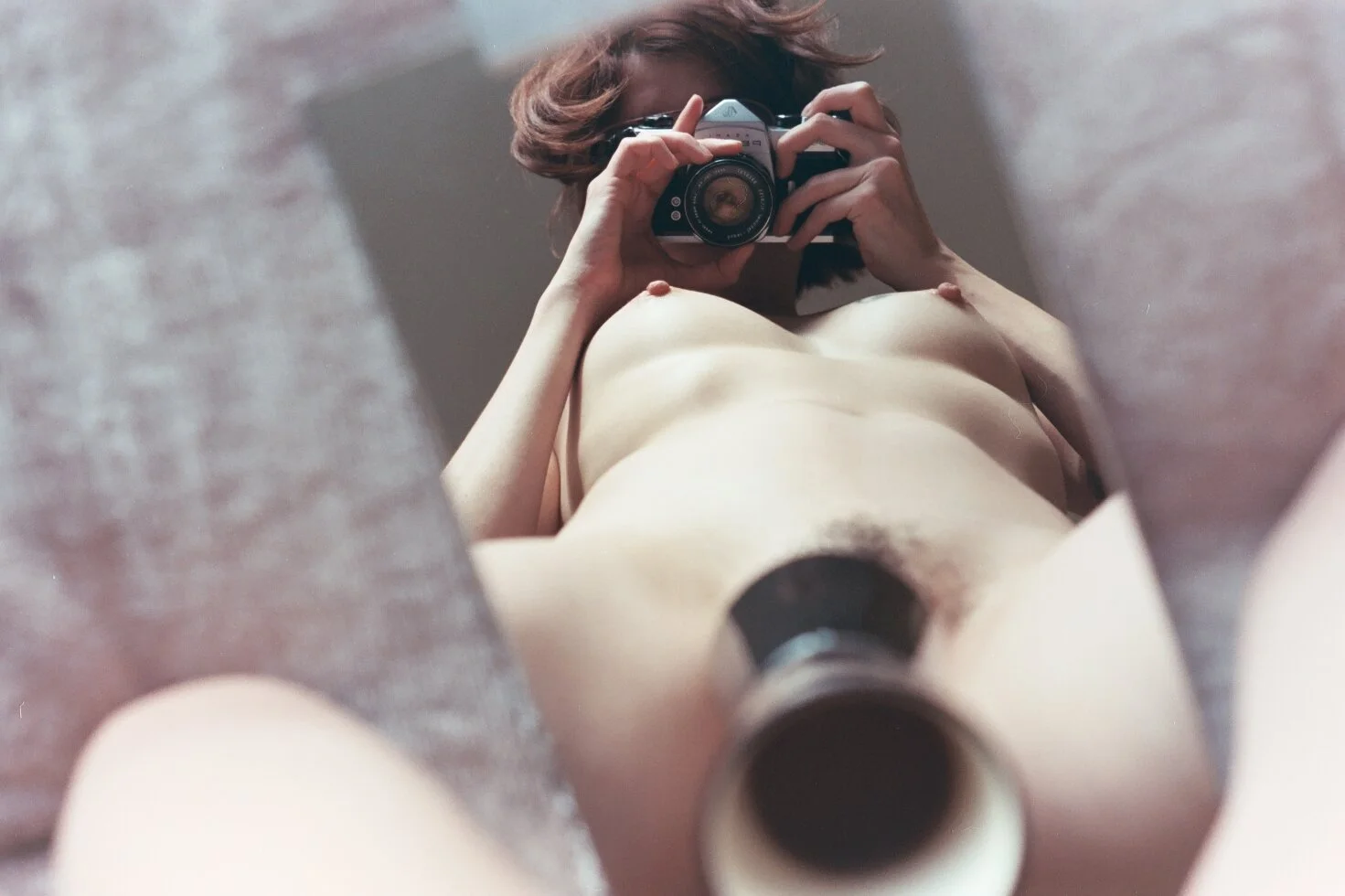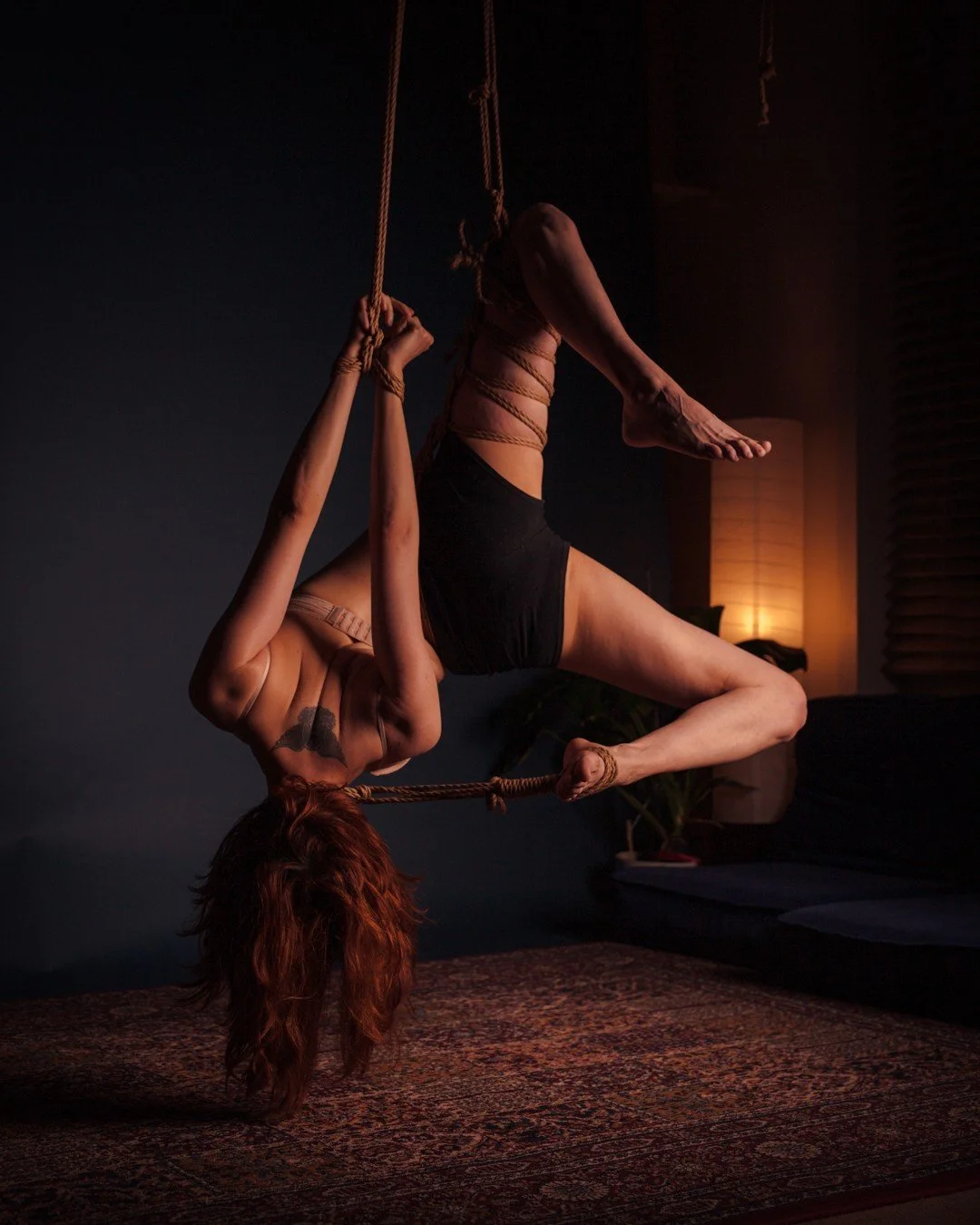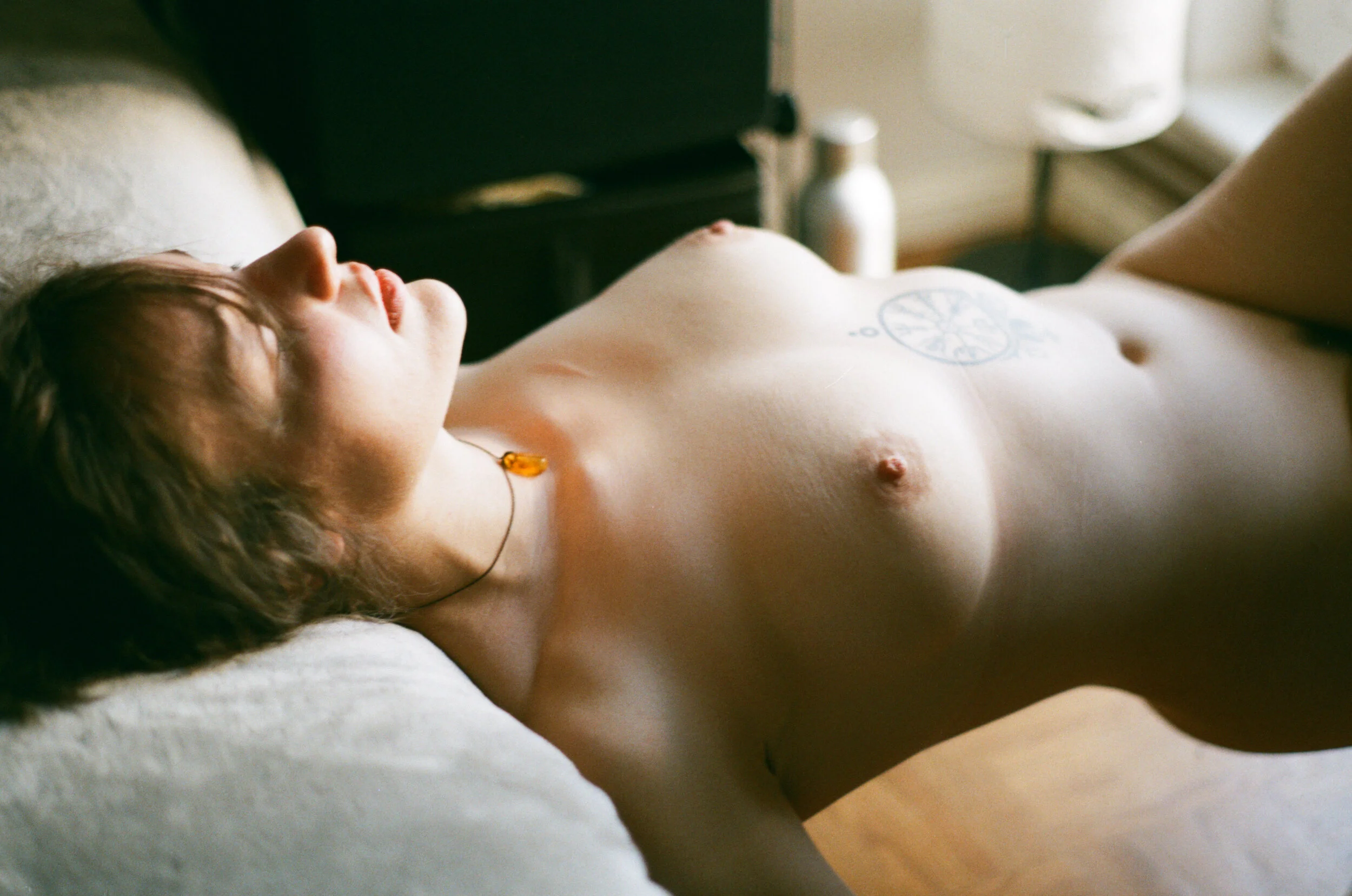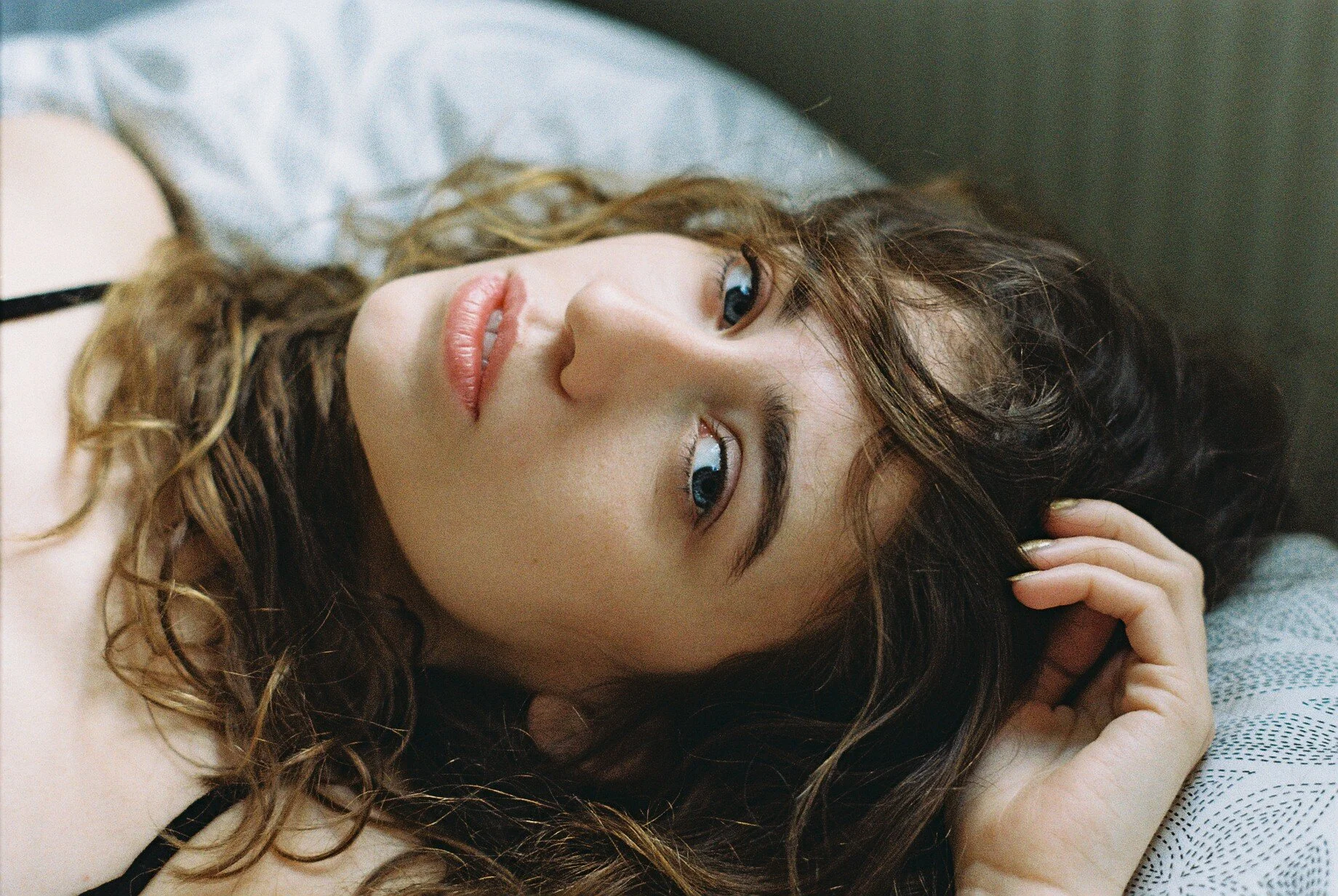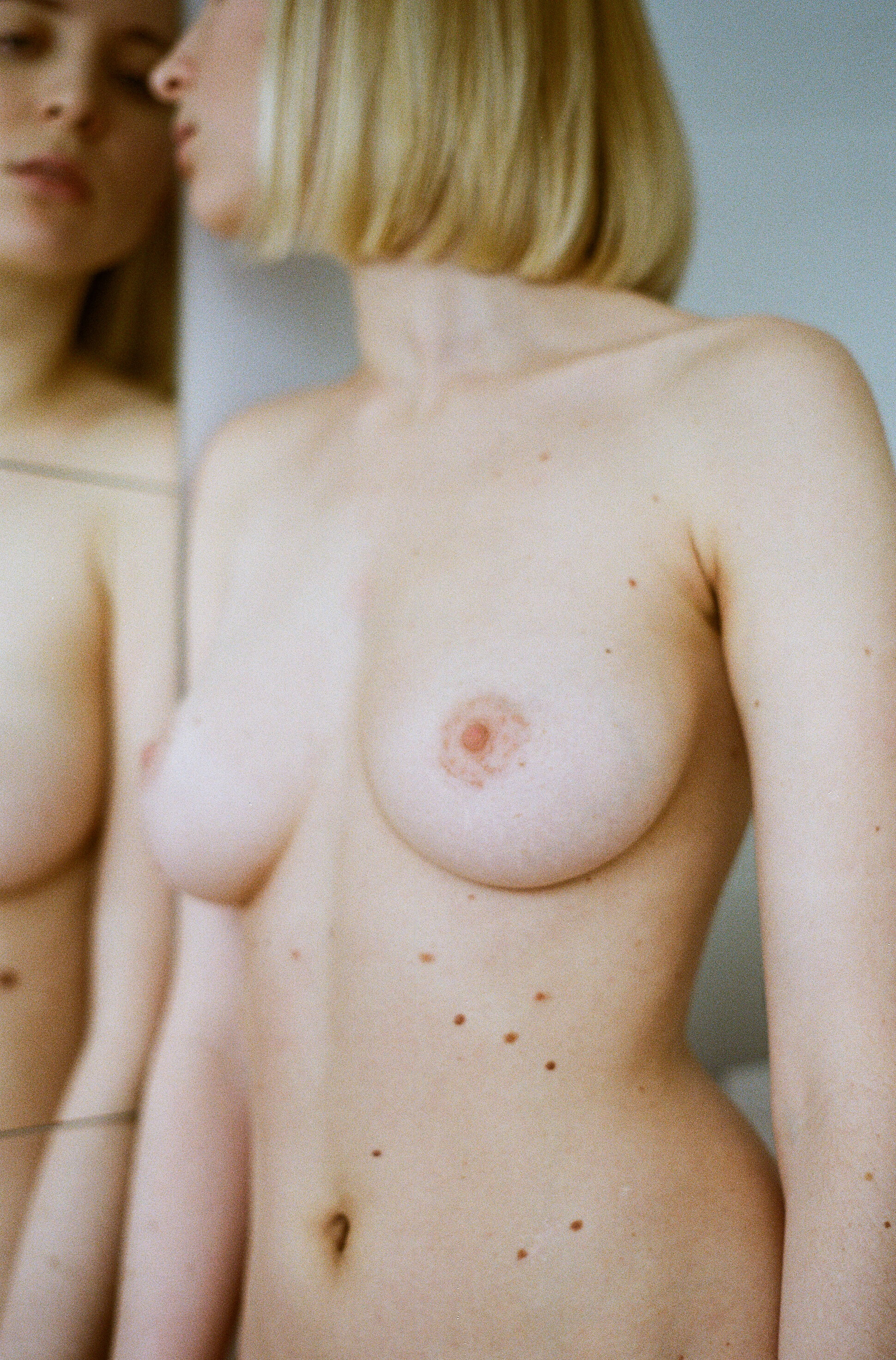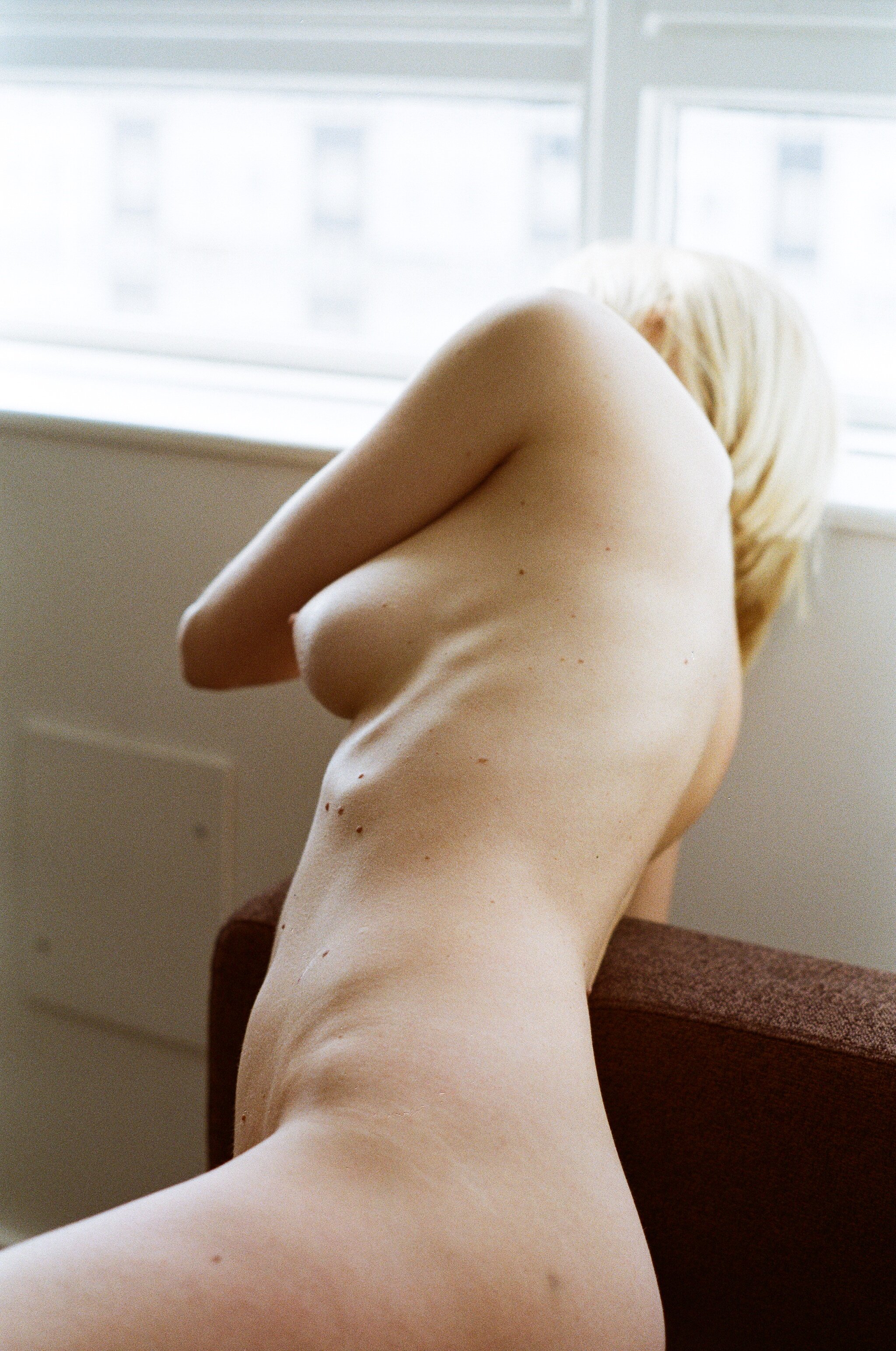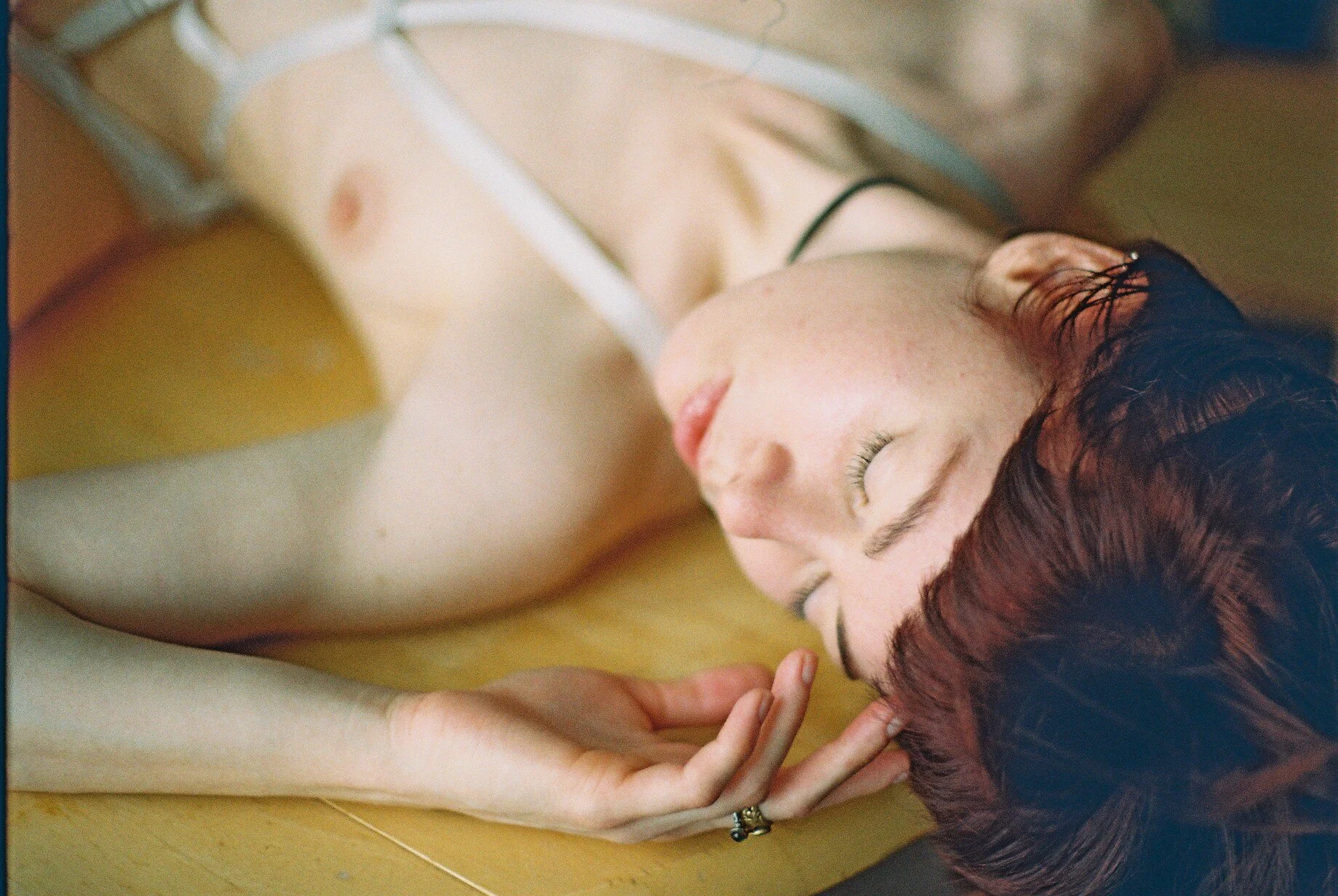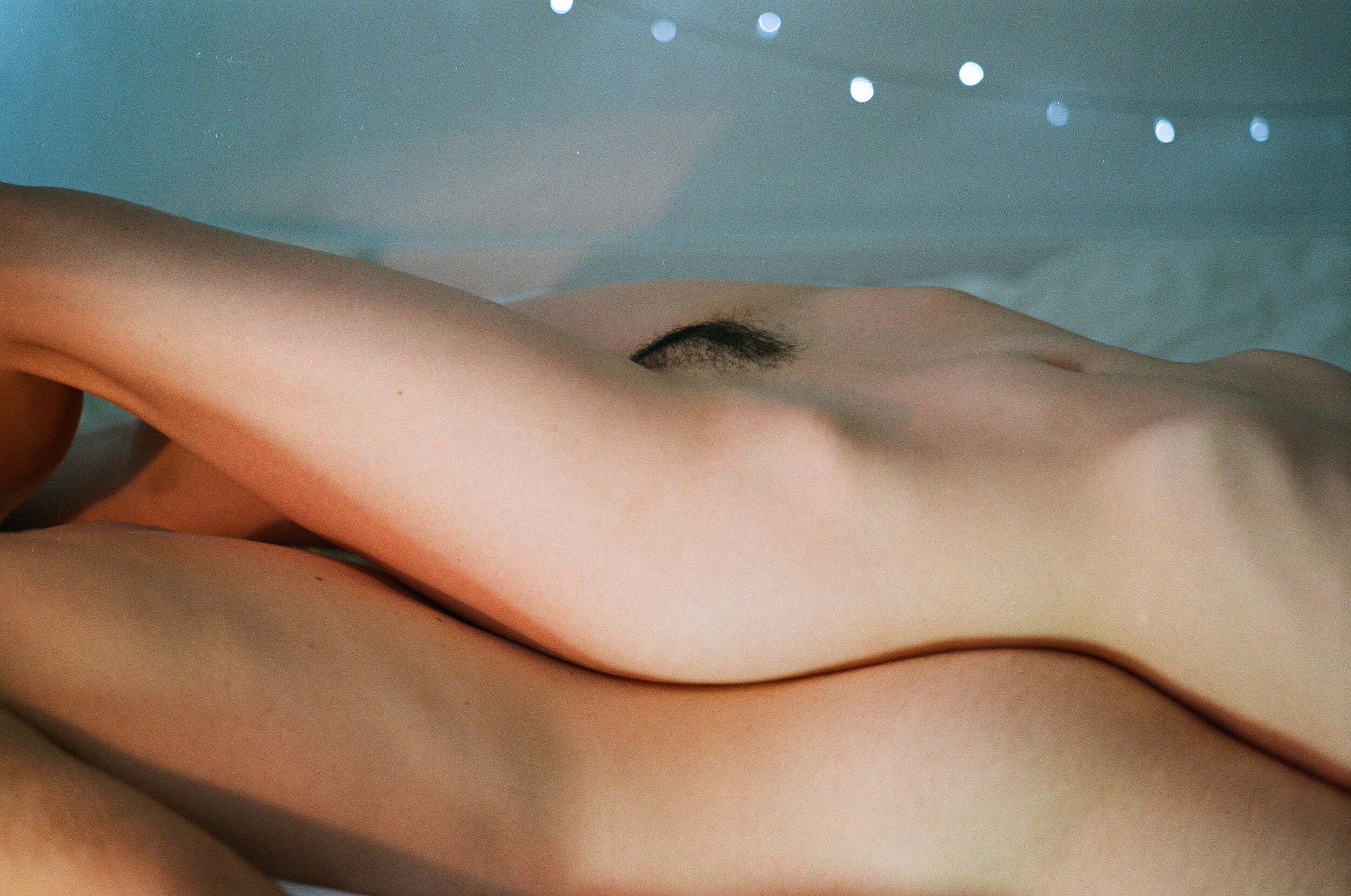“I am focused on what matters: humans and light.” - Photographer Nina Sever in conversation with Thomas Berlin
Nina Sever
Nina is photographer and director in London and Berlin. We talked about their photographic approach, the different ways to create content and Shibari.
Image: Nina Sever by Megan Eagles
Thomas Berlin: Nina, as far as I am aware, you are a model, photographer, director and writer. All of your activities are related to human body, intimacy and sexuality. Is that described correctly? Or how would you express that?
Nina Sever: You are pretty much correct, apart from modeling, it’s not something I ever felt like intrinsically mine, and I rarely pose these days and only on my own terms; I find sex performance more fulfilling to what I want to communicate. Posing for a photographer or fucking for a director are not the same but they are often mixed-up. Because nakedness is often seen as a taboo, and the models are expected to be naked under the excuse of art, – of course it is not always the case - modeling nude sessions are not as well negotiated as the sex scenes where everything has to be as clear as possible. That leaves too much space for harm. So as a photographer I make those boundaries very clear with the models I work with.
Sexuality is not always part of my work, whilst creating without a certain degree of intimacy is something I am not familiar with. It happens that sometimes sexuality is a good tool to convey a visceral feeling that wouldn’t make much sense on its own, but it does when given the right space within that intimacy.
The human body is a fascinating thing, but it can exist in a desexualized form and I am interested in exploring that range of emotions too.
Thomas Berlin: Did you have the self-confidence that you express in the pictures even before you became a model in nude photography?
Nina Sever: What you see in the pictures is very often not what a model really feels. I was quite happy and confident before my first year of nude modeling, then the social stigma, the abuse of power from photographers, and the high expectations from the viewer knocked out the little love for my body I had left. It created a lot of shame and pain, and that’s as far as I want to dig into that in this conversation because it’s a trauma I am still processing.
I started to feel freer and more at ease with myself and the external world when I started taking self-portraits and turning down modeling gigs. The indie porn world and the agency it allowed me to have over my own body and my own decisions, were also really therapeutic.
Model: Kate Kushu / © Nina Sever
Thomas Berlin: Nina, you are also a photographer. Did that evolve from modeling? And how did the combination of photographer and former model affect these two activities?
Nina Sever: I am mainly a photographer, and it did not develop from modeling. I studied photography before committing to any other form of art on a professional level, and only then decided to pose for someone else. I experimented with self-portraits first, then some photographers started to reach out to see if I were interested to pose for them.
If modeling taught me anything besides how to position myself in accordance to the light, is how not to treat other human beings. Honestly, I’ll say it again, modeling was just not for me, I needed money and I liked to travel. I love to take photos so much more than being a static subject in space. So, when I shoot with a model I make sure they have the complete control over their body, and I take on the responsibility over their boundaries that if they don’t communicate I will definitely ask about, and if they are not sure if they want to do something, I avoid doing that thing altogether. It’s not that hard, and a person is very interesting to photograph regardless if their clothes are on or off.
Thomas Berlin: As a photographer, have you also focused on nudes and sexuality? And what is important to you or what do you want to express with your pictures?
Nina Sever: These days I mostly shoot nudes and I mostly keep them desexualized. When I work with sexuality, I make sure my concepts stand strong on their feet before I ask anyone to get undressed. Eroticism can be conveyed in many ways, and nude does not equal sex unless that’s what I want to communicate. I make my intentions clear before I shoot, and I express them to everyone involved in the creative process.
I want to express intimacy. I want to tell the truth, whatever that truth is in that given moment. I want to make it about myself just as much as about the person involved in the shoot. I want to create a space for a non verbal conversation.
Model: Daisy / © Nina Sever
Thomas Berlin: What are the artistic opportunities and challenges of erotic art for photographer and model compared to non-nude work?
Nina Sever: To be honest, my only issue at the moment is the censorship. Since I personally embraced my love for sex and how it could be portrayed visually, everything fell back into the place. As an artist I get away with a lot and that privilege I didn’t ask for bothers me. I am a sex worker and I am proud of it, I don’t think my “artistic” work deserves to be on social media more than other people’s. I published my nude work for years before Instagram banned me, and that happened only after me officially coming out as a sex creator.
But I find my opportunities everywhere I can, dusting off my offline skills, because what happens online is not all that there is.
Thomas Berlin: What is the proportion of your freelance work compared to contract work?
Nina Sever: Interesting question, because one doesn’t exclude the other. For example, see my films for XConfessions, they were commissioned by Erika Lust Films, but I submitted original scripts with little or no notes. I was free to create whatever I wanted within the parameters of story based porn. Other things I am working on at the moment will be pitched to a third party, and when someone is investing in you there might be some compromise.
A lot of my work is like that.
Then there is time I commit to my own projects, and the smaller they are and the less money is involved, the wilder my brain goes; then… the money magically appears, which makes me think that I should just do whatever the hell I want, basically. And so I do.
I create a lot of pornographic content of myself, in whichever way I am inspired in the moment, I then sell it or license it. I create the demand by just doing my own thing, which is pretty cool, but it took me more than ten years to come to this conclusion and trust in myself.
Thomas Berlin: Creating demand by just doing your own thing is really cool indeed. But could you just give me an example?
Nina Sever: Everything you see on my website, for instance, is created because I wanted to, not because someone else did. That suscitated interest, and some people ask me to work for them to come up with my own ideas, rather than commissioning their own. They like my style and they want to hire me, rather than hiring me just becuase they need someone with a camera.
Same with sex content. I just post what I actually enjoy and people subscribe to see it. I don’t take on custom videos, for example, because I only want to do what I genuinely enjoy without feeling like I don’t have agency over my own pleasure.
Self portrait Nina Sever
Thomas Berlin: When are you satisfied with a picture? And what is a good picture anyway?
Nina Sever: I am satisfied before I even develop the films. I denied myself the pleasure of acknowledging this for a long time, I thought it made me arrogant, but now I just take proud in my work and enjoy my confidence. I am very good at analogue photography and I exactly know what I’m doing, I admire that in myself, and I worked hard for it. I look into the viewfinder and I see someone, I see the colours or the absence of them, I know what the light is doing and how it’s going to react within my visual and technical parameters, and when the shutter clicks I know that what I saw in my brain is what I’ll see on the negatives, or the scans or whatever. I know it’s going to be a good picture because of that, and because I enjoy the process widely, and I am extremely grateful that another human being wanted to share the moment together.
Emotionally speaking, a good picture is when I look at it and I feel. It doesn’t matter if I remember how I felt in the moment of taking it or not, as long as I feel, it’s an image worth having in the world, even if just for myself.
Thomas Berlin: How can I imagine a nude or erotic shoot with you? By that I mean the choice of model, how to deal with the model, choice of location, concept, implementation, duration of the shoot, people involved etc.
Nina Sever: I just see someone that inspires me a story and I ask them to shoot, it’s as simple as that. I stress a lot about the boundaries of the model, and I communicate my own boundaries clearly by saying exactly what I want to portray. I don’t dance around a concept, especially if it has strong erotic connotations. The people that work with me deserve to know how much vulnerability is required from them.
Usually it’s just myself and the model.
I don’t like the word “deal” when it comes to handling human emotions and expectations. A model is a human being, so long as that is clear there is not much to deal with, it just takes a bit of awareness and openness. Humans have periods, humans need to pee, humans feel cold or too warm, humans get thirsty and hungry, humans need comfort and support, humans have anxieties and worries, humans are not objects.
Thomas Berlin: You can also be seen on Shibari or bondage photos. Can you describe the feeling during and after a Shibari session? And what is the special fascination of bondage from your model's point of view?
Nina Sever: I prefer to be called “rope bottom” rather than “model”, so it takes me away from the connotation I give to the word “model”, and it makes me feel more active.
The feeling is different each time I am being tied, and it varies from person to person. My sessions are non sexual for the majority, and that way it allows me to focus on my body as it is, without any expectation or distraction. I like the intensity of rope suspension, it leaves no space for doubt, I can only breathe through it and who I am in this society doesn’t matter anymore. I like to feel strong, and I love pain, it’s an element so interesting to observe and transform. It makes me realize how little and at the same time how much I know about how I actually function. It’s very humbling and empowering at the same time.
Before my rope partner and I begin, the world goes quiet; other times it’s extremely loud in my thinking, but it definitely fizzles out as the rope becomes tighter around my chest. After a session, I either feel relieved or frustrated, it depends how it went physically and psychologically and what is my relationship with the rigger.
Nina Sever rigged and photographed by Conor James
Thomas Berlin: Can you imagine a Shibari shoot for yourself similar to the legendary Nobuyohi Araki session with Tori Black? And what is the general attraction of the viewer about this type of art with which Araki became a pop star?
Nina Sever: I don’t like to compare myself to someone else, and every dynamic is different. Also, committing to a Shibari session for me is not functional to a shoot, and I don’t know if it was like that for Araki and his partners. I like being tied up, and it’s nice to have a documentation of that as opposed to setting up a photo set and shaping the rope session around that final result. But many people tie with the shooting process very clear in their minds, and it doesn’t make it any less intimate or enjoyable. It’s just very personal.
In general, people feel attracted to beauty in all its forms, and when it conveys intimacy and eroticism it makes it even more interesting. That’s what in my opinion made Araki so popular in his work. It feels authentic, it tells a story.
Thomas Berlin: Are common genre classifications such as nudes, erotic, pornography etc. relevant to you? Are there different value levels? I ask because a number of nude photographers emphasize not to depict pornography, which sounds sometimes like a moral judgment.
Nina Sever: It does, doesn’t it? I like to make a distinction only when it’s functional to my communication. If I need my model to be naked, I cannot just throw the word “pornographic” around. As I said, naked doesn’t equal sexual.
But sometimes people get the word “erotic” confused with pornographic, and something can be pornographic but not erotic, there are many variables. Someone can be fully dressed in a restaurant but say out loud that they have a dildo in their ass, so the definition of explicit sexual representation goes to hell and loses its pornographic state as we know it.
It’s a bit silly in 2020 to keep the parameters so rigid out of fear and ignorance, but I think it’s okay to make a distinction to express the intention and educate the society.
Thomas Berlin: Where is the separation between nude photography and pornography? What could a distinction be relevant for and does it have anything to do with the artistic quality?
Nina Sever: If the nude is not sexual, then it is not pornographic; I cannot stress enough about the fact that nudity is not a synonym for sex. The distinction is relevant for the reasons I mentioned above.
I don’t believe any of this has to do anything with the artistic quality. Art includes anything you want it to include, and it encompasses pornography too. I could talk about the meaning of art in general because I think that’s where the concept resides, but I’d go terribly off topic.
Thomas Berlin: No problem, Nina. Just go off topic and let us talk about art in general. And if it’s helpful to differentiate between art and non-art in photography.
Nina Sever: If it communicates something, as per it was created with the intention of communicating, it could be art. If it’s sexual or not is completely irrelevant and it’s up to the creator to set the intention.
Charlotte Grimm / © Nina Sever
Thomas Berlin: What are your limits as a model and how do you find the limits of people in front of your camera when you are the photographer yourself?
Nina Sever: My limits and boundaries vary depending on how I feel and where I am in time and space in my life. Same applies to the people I work with regardless of what side of the camera. I just make sure we communicate openly by creating a safe space to talk.
Thomas Berlin: How do you deal with emerging (?) prudishness in society or the media? Or is that not the case in London? Does prudery influence your artistic work and the marketing opportunities for your pictures?
Nina Sever: I don’t think it’s emerging. None of this is new, and if anything it is easier now, perhaps not through social media at the moment, but we did make some progress from some of my acquaintances calling me a hooker because I was wearing a mini-skirt in high school, and those same acquaintances paying to watch my porn now. And no harsh feelings!
I used to stress a lot about this but I think I burnt out and I simply don’t give a fuck. I just keep creating without thinking of any of that until after the creative process is completed.
Self portrait Nina Sever
Thomas Berlin: What is the importance of technology in your photography? Btw: what camera and lens do you use?
Nina Sever: The technology is completely irrelevant, as long as it’s there and functioning. I have a decent video camera (Nikon D5200) and a good analogue camera (Pentax Asahi – and I’ve been obsessed with fuji color and Ilford XP2 b/w for a long time now), both with 50mm lens, and that’s all that matters. I can create with shitty tools too because that’s what I had when I couldn’t afford anything, but it’s nice to have a couple of good tools to make my working process smooth but also keep myself focused on what matters: humans and light.
Thomas Berlin: Does the analog appeal for you lie in the photographic process or in the analog look of the finished image?
Nina Sever: I tried digital here and there but the amount of settings and the things you can do with it really distracts me from my main aim. Analogue is just easier, there are a few simple rules and I can bend them to my advantage, and I always know what’s going on technically. I am a very impulsive and intuitive person when it comes to creating, so it is really important to have everything ready to go, and analogue allows me to feel light and free.
The aesthetics is really pleasing too, and the whole process is quite meditative.
Thomas Berlin: I don't want to stress the technical aspects too much, but when it comes to analog photography I can rarely hold back: Do you develop your films yourself, what size are your prints? And does it make a difference to your feelings whether you hold the picture as a print in your hand or look at it on a computer screen?
Nina Sever: No, it doesn’t, unless it’s a high quality print. My prints vary from A4 size to as big as you want it since I can high quality scan from negatives. I don’t develop my own films, I rely on a laboratory I trust.
You mentioned earlier that you are a proud sex worker. Do you mean your porn content creation of yourself or do you have also other ways as a sex worker?
Nina Sever: Yeah, I also write erotica and do script supervision for intimate and/or sexual films, I work as an intimacy coordinator on photo and film sets. All that is sex work too.
Self portrait Nina Sever
Thomas Berlin: You're also a director. Can you please say something about this activity?
Yes, I am. I’ve only started two years ago, and I’ve directed two films for XConfessions. I had the opportunity to work for other companies but it didn’t go so well, because very often in this world you have to multitask when the budget is lower, and when I have to write a scene, direct it, operate the camera, and make sure everyone on set is alright, I literally lose my mind. I kinda became better at it out of necessity, so that I could create my own content for sell, but I am far from being a videomaker, which is not the same as being a director.
I love directing and I want to do more of it in the future, but not in porn, not because I don’t like it, but because I want to explore other things too. In the meantime I am focusing on writing fiction, and scripts…
Thomas Berlin: Interesting, that makes me curious. Can you please say what or for whom you are writing?
Nina Sever: I used to write for GQ Italia, and Playboy Italia, and other magazines like C-Heads, and it all happened out of luck and my impulsiveness. I was a pretty good interviewer but it didn’t feel like a path I wanted to pursue for too long, so I changed again and started my own blog (which you can find on my website). I started to talk more openly about sexuality and trauma, feelings and relationships, and it felt more fulfilling that talking just about modeling and photography. My visual work improved a lot when I had the opportunity to process my visions and emotions in words, so that was a plus; then I realized that I could entwine words with images, and I’ve started to write my own essays for the editorials I was submitting. Then Erika Lust got in touch and I learned how to write a script, which was extremely difficult and exciting at the same time.
So, now I work on my own projects: a TV show and a fiction book. It’ll be a long time before any of that is out in the world, but I am committed. In the meantime I take on commissions for essays on art and sexuality, but I try to be very selective because I only have that much mental capacity and emotional energy for someone else’s visions.
Thomas Berlin: I am impressed by your versatility in terms of expression. At the same time, there seems to be a common thread in your activities (photographer, model, director and author). As I have already mentioned, the keywords human, intimacy, physicality and sexuality come to mind. Could you please say something about this, or correct my impression if necessary.
Nina Sever: Thank you for saying that! I am also a musician, but I decided to leave that out as a hobby. I just make sure I don’t limit myself by compartmentalizing who I am. I always felt the urge to express myself outwardly, so that’s what I’ve been doing, how I do it is a matter of what I have in my hands in that moment. So if those keywords feel representative of what you see of my work, I’ll take it, if that changes through time, I’m also cool with that.
Thomas Berlin: I read the following sentence from you: "Down to earth and close to my heart." Can you please put this statement in context with your work?
Nina Sever: Well that pretty much summarizes everything we talked about so far. The line I love at the moment is: “wild at heart and weird on top”. It’s from Lost Highway, by David Lynch. I need to game up my weirdness.
Thomas Berlin: You live in London and Berlin. Why actually? Where are you more at home?
Nina Sever: Why not? I feel at home in both these cities.
Thomas Berlin: How do you experience the mindset of people in both cities on the topics of nudity and sexuality, both in society and in the visual arts?
Nina Sever: I feel a little bit less self conscious to talk about sex work when I am in Berlin, people seem a little bit more at ease with their sexuality, and they have many outlets to express that, therefore the idea of paying for pleasure doesn’t seem so weird. London… dear London. There’s still a lot of work to be done.
As per visual arts, London seems to suddenly relax when the word art is thrown into the picture, it allows them to let their libido flow a little bit more.
And then, both Berlin and London have an incredible queer community made of supportive and sex positive people.
Thomas Berlin: How does the photo scene differ between the two cities in terms of artists and buyers in nude photographs?
Nina Sever: I don’t know the answer to this question. At the moment I’m in standby with selling prints, but I offer other kind of art services and most of them happen online because of the world pandemic.
Model: Janine Mizéra / © Nina Sever
Thomas Berlin: Did Brexit make people in the UK more conservative, also with regard to art / culture?
Nina Sever: I don’t think so. I didn’t notice any shift in perception, but it was definitely demoralizing for many of us.
Thomas Berlin: Nina, with so many forms of expression in your work, it is of course also interesting to learn more about yourself as a person. How far back do your artistic origins go, how long have you lived in London, what did you start with professionally and all that?
Nina Sever: I’ve lived in London for six years, and only in the past two years I allowed myself to be who I really want to be as a professional. I became tired of the misery it seems that the artists need to go through, and I allowed myself to enjoy my little achievements, and stopped limiting myself based on what people said, and just stopped creating what I thought people would like. I like to be the artist that creates first, and releases after, and then gains interest from like-minded people or critics. I don’t like to use my artistic tools for someone else’s glory; I like to create art from an internal impulse rather than an external need or demand.
I like to think that me being an artist doesn’t have a beginning or an end, because it doesn’t matter to me what I use to create as long as I keep finding ways to express myself, and I’ve been doing that my entire life. At first with crying, when I was born and needed the world to hear I was there, then finding other peculiar ways to make myself recognized.
Thomas Berlin: You describe yourself as non-binary. What does this mean for you personally and how does it influence you when dealing with other people?
Nina Sever: I do describe myself as non binary, because I am non binary. What it means to me and what it means to others is not a matter of opinion, it’s my gender. I am who I am, I don’t get to choose that, I can only embrace it. If the society were more accepting of people like me, it would make things a little bit easier in my day to day life, but it doesn’t affect the way I create.
Thomas Berlin: How do you want to develop in the next few years? Do you have a project or long-term plan?
Nina Sever: I want to finish my book and get it published, and I want for my TV show to be produced, whether I direct it or not is not particularly relevant at the moment. I want to become a very good rigger, for some reason that feels very important to me, perhaps because it’s a craft that doesn’t require any attention or approval from the viewer, I have a chance to build my reputation from scratch and it’s very exciting.
Thomas Berlin: Nina, we now come to the end of an intensive and exciting interview. Do you want to say something else?
Nina Sever: Thank you very much for your stimulating questions! It was a pleasure to express myself in this way with you.
Thomas Berlin: Thank you and I wish you an exciting and successful time with your projects.
You can reach Nina Severs website here.
